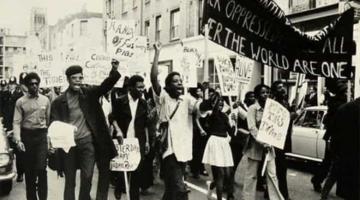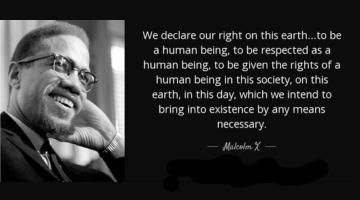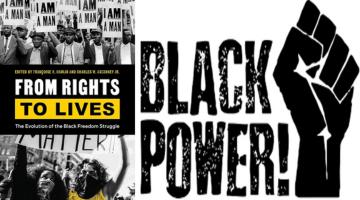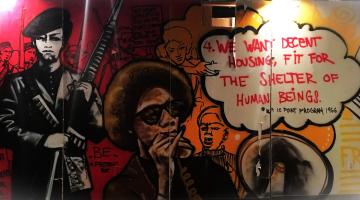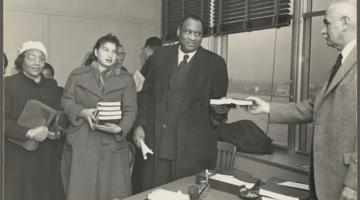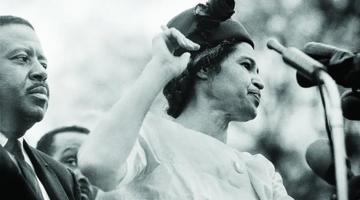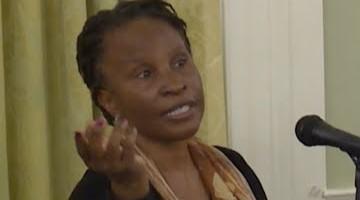In this series, we ask acclaimed authors to answer five questions about their book. This week’s featured author is Dara Baldwin. Baldwin is an activist, a scholar, and an author with over 20 years of experience in policy and social justice work. Her book is To Be a Problem: A Black Woman's Survival in the Racist Disability Rights Movement.
Description (from publisher):
For over 20 years, Dara Baldwin has often been the only person of color in the room when significant disability policy decisions are made. Disenfranchisement of people of color and multi-marginalized communities within the disability rights community is not new and has left many inside the community feeling frustrated and erased.
In To Be a Problem, Baldwin candidly shares her journey to becoming a disability activist and policymaker in DC while critiquing the disability rights community. She reveals the reality of erasure for many Black people and people of color in the disability community and argues that, in turn, many white disabled people center themselves within the movement without addressing their own white privilege.
Disability rights groups have been centering white, straight, cisgender people while racial justice groups often fail to center disabled people, leading many Black and Brown disabled people to start their own Disability Justice organizations. Drawing from her unique vantage point, Baldwin calls readers to understand the shortcomings of the disability rights movement while inspiring us to push all movements towards a more inclusive and authentic liberation.
Roberto Sirvent: How can your book help BAR readers understand the current political and social climate?
Dara Baldwin: My book brings the mostly uninvestigated or unknown disability movement into the conversations about the world we are currently living. In particular the Black, Brown and Indigenous disabled community and how they must be the leaders of our fight to freedom. There are multiple discussions that run throughout the book which cover disability as a liberation movement as well as the issues and concerns within the so called progressive and liberal movements. Our current political and social climate has revealed the many communities who have lived at the margins in terror and harm for years have been ignored. There is a need for a shift in the way in which we as a society connect to the hope and joy in the work of creating love in this world. The prose gives a roadmap to assisting with solutions to ending the hate, harm and disenfranchisement of not only disabled people but all communities. We must center the dismantling of Black, Brown and Indigenous disabled people and this will facilitate all oppression in this world.
What do you hope activists and community organizers will take away from reading your book
There are so many things in my book to take away and learn. In the introduction I have a glossary of words and terms that have been co-opted and re-defined by white progressives. I set out to define them in the original framework from Black liberation. Such as explaining why it is not enough for movements to be anti-racist, they must be Pro-Black. Many have been anti-racist but do not center Black people in their work. I hope many use this glossary as a guide and educator. The book also discusses a number of things about how all rights movements do not work for Black, Brown and Indigenous people because they are centered in whiteness and white supremacy. All forms of rights work, reproductive rights, housing rights, transportation rights have caused the development of justice work – reproductive justice, housing justice, disability justice. Because the rights work did not work and in order to accomplish the end of oppression we must embrace the framework of liberation. I discuss a phenomenon in the disability rights movement where white disabled people believe they cannot be racist because they are disabled. They also engage in the harmful practice of comparing their suffering to that of Black people. They have a campaign called “the disability underground railroad” named after the Harriet Tubman Underground rail road. There is a lot of information about the wrong in the disability rights movement but there is not a great deal of information about how to make things better. I want readers to be hopeful for a better future.
We know readers will learn a lot from your book, but what do you hope readers will un-learn? In other words, is there a particular ideology you’re hoping to dismantle?
There are a number of things in my book that I want readers to unlearn and I spend time describing why they are harmful and how we can create the change that is needed. Four concepts are: that the nonprofit industrial complex is our only way to freedom; the progressive/liberal movements of this country embrace the liberation of all people; that political parties especially the Democratic party will create justice for all (neither party will do this); and the reasons for the erasure and disrespect of disabled people, in particular Black, Brown and Indigenous disabled people. I will discuss the final one here. In this world people look upon and judge disability as a fault, a horrific way of living and/or with pity. The Ugly Laws which were created in 1896 in the United States provided a foundation for the erasure of disabled people. These are laws that said people with disabilities could not be in public spaces. Let that sink in! In the book I discuss the horrific consequences these laws have created and how society has embraced and uses this in policy making even in the 21st Century.
I want readers to come away from my book with the knowledge that people with disabilities are beautiful, strong, caring, invested in the fight for liberation and loving. This is especially for Black, Brown and Indigenous disabled people. They are brilliant people with the power to create strategy through multiple forms of resistance – the arts, education, freedom fighting, policy and so much more. The concept that Black disabled people cannot be leaders is a misnomer, one that has been proven time and time again. Disabled people are the very fabric of this world that we must learn from, be honored by and embrace with dignity, care and love.
Which intellectuals and/or intellectual movements most inspire your work?
My top twelve are Black intellectuals, but there are many others:
Sojourner Truth, Ida B. Wells, Zora Neal Hurston, Mary Church Terrell, Anna Julia Cooper, bell hooks, Frederick Douglass, W E. B Du Bois, Alain LeRoy Locke, Langston Hughes, Malcolm X. and James Baldwin.
I am a Black liberationist and abolitionist, which is defined and discussed throughout the book. The blessing of having two parents who were gifted, talented and adventurous provided me with a foundation for a life of exposure to all that was needed in my journey to becoming a changemaker. I learned about and from this distinguished list of Black Intellectuals, growing up in the Tri-State area of (NJ, NY & PA) where I had the encouragement, care and ability to roam cultural centers like libraries, museums, historical sites and emersed myself in the arts – sculpture, painting, dance, gardens, music etc. – they all had a lasting effect on my capacity to learn and be in awe of the phenomenal things my people have contributed to this world.
The title of the book is based on W.E. Du Bois’s Souls of Black Folks and his work in the South discussing racism and how the Southerners called him a problem. In the disability rights movement, I was often the only person of color in the many rooms where multiple organizations did policy strategy work. In those rooms I would constantly bring up issues about race, sexual orientation, immigration, incarceration and more. This is how I got the title of being “a problem” to the white centered work they wished to do. It was the perfect title for my memoir manifesto.
Which two books published in the last five years would you recommend to BAR readers? How do you envision engaging these titles in your future work?
This is so hard – only two!
Rooted: The American Legacy of Land Theft and The Modern Movement for Black Land Ownership, by Brea Baker
The Last Plantation: Racism and Resistance in the Halls of Congress, by James R. Jones
These are two brilliant authors whom I know and have worked with on some level in creating change for Black people. Their work is about Black liberation. They both discuss the horrific ways in which a particular group of people – farmers, Black land owners and members of and staff with in the Halls of the United States Congress (both House & Senate side) – are treated. These authors provide intimate detail into the subject matters and history with prose that is inviting, educating, causing critical thinking and just plain good. Then they provide prophetic and investigated knowledge about how things can be different; by providing carefully crafted solutions to these problems. We all have a desire to create a better world for all people. The work must be done through the leadership of Black, Brown and Indigenous people. At the forefront of this work is dismantling the historic, lingering racist, white supremacist, patriarchal, ableist, misogynoir, homophobic, and xenophobic systems that currently run our county and world. We continue to push communities to engage in our topic areas – land ownership, Congress and disability justice – and get them to move from their traditional harmful progressive/liberal and rights framework to that of justice, abolitionism and liberation.
Roberto Sirvent is the editor of the Black Agenda Report Book Forum.

